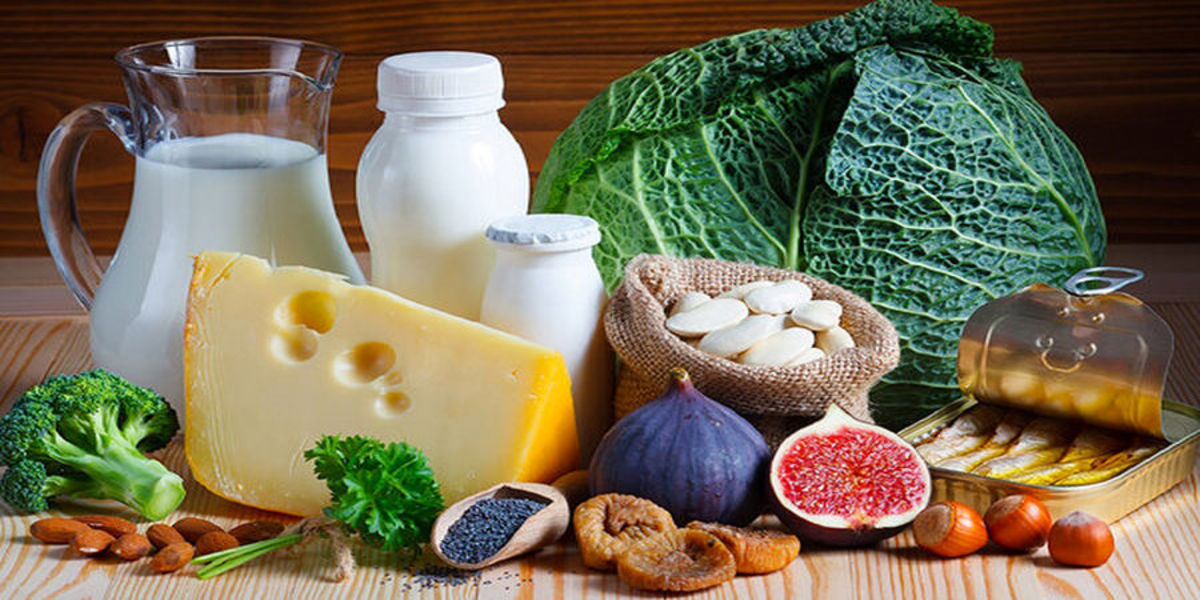Discover the Best Vegan Sources of Calcium for Strong Bones

No matter what diet you choose, the public often overlooks the importance of calcium. However, identifying and using plant sources of calcium is very important, especially for vegans because they do not use animal dairy products. Of course, there is no need to worry because plant sources of calcium are very rich and available. It is enough to know the amount needed by the body in each of them.
Calcium plays an essential role in your body. The most important role of kalism is building and strengthening the bones of your body. Also, this mineral is particularly important in muscle contraction, blood pressure regulation, nerve transmission and blood clotting. The daily nutrient requirement for calcium is 1000 mg per day for adults. This amount reaches 1200 mg for people over 50 years old and 1300 mg for children aged 4 to 18 years.
1. Foods containing soy
Soybeans are naturally rich in calcium. One cup (175 grams) of cooked soybeans provides 18.5% of your daily dietary requirement, compared to 27.6% in soybeans.
Products made from soybeans such as tofu, tempeh, natto, soy milk and soybean oil are also rich in this mineral. Tofu made with calcium phosphate contains 350 mg per 100 grams. Tempeh and natto made from fermented soybeans also contain good amounts of calcium. A 100g serving covers 11% of the daily requirement, while Nato provides about twice that amount.
On the other hand, less processed soy foods are a good source of fiber, vitamins and minerals. In addition, soy is one of the few plant foods that contain protein. This is because soybeans contain a good amount of amino acids needed by the body.
Summary
Soybeans and soy-based foods are excellent sources of calcium. They also provide complete protein, fiber, and an array of vitamins and minerals.
2. Beans, peas and lentils
Besides being rich in fiber and protein, beans and lentils are plant sources of calcium. In general, some legumes that provide the highest level of this mineral per cup (about 175 grams) include:
White beans: 13% of the daily nutrient requirement
Black beans: 11% of the daily nutrient requirement
Chickpeas: 9% of the daily nutrient requirement
Red beans: 7% of the daily nutrient requirement
Lentils: 4% of the daily nutrient requirement
Winged beans (Gua): 26% of the daily nutrient requirement
In addition, beans and lentils are rich in other nutrients, including iron, zinc, potassium, magnesium, and folic acid. They also contain nutrients like phytic acid and lectins that reduce your body's ability to absorb other nutrients. Soaking, sprouting and fermenting beans and lentils can help absorb more nutrients.
In addition, diets rich in beans, peas and lentils lower bad cholesterol (LDL) and reduce the risk of diseases such as type 2 diabetes, heart disease and premature death.
Summary
Beans, peas and lentils contain good amounts of calcium and are excellent sources of protein and fiber. Soaking, sprouting, or fermenting them can improve nutrient absorption.
3. All kinds of nuts
All types of nuts contain small amounts of calcium, but this amount is higher in almonds. 97 mg per 35 grams!
Walnuts, pistachios, hazelnuts and cashews provide between 2-3% of the daily requirement. Nuts are also a good source of fiber, healthy fats and protein. They are rich in antioxidants and contain good amounts of B vitamins, magnesium, copper, potassium and selenium, as well as vitamins E and K.
It's good to know that eating nuts regularly can help you lose weight, lower blood pressure, and reduce risk factors for metabolic diseases, such as type 2 diabetes and heart disease.
Summary
Nuts are a good source of calcium. A quarter cup (35 grams) of it will help you provide between 2 and 10% of your daily dietary needs.
4. Seeds
Their seeds and butter are also plant sources of calcium, but the amount in it depends on its type.
Tahini, the butter made from sesame seeds, has the highest amount of calcium. This seed provides 130 mg per 2 tablespoons (13% of the daily requirement). In comparison, the same amount (20 grams) of sesame seeds provides only 2% of the daily requirement to your body. Chia seeds, flax and hemp also contain good amounts, providing about 5-6% of the daily requirement in every 2 tablespoons (20-25 grams).
Like nuts, seeds contain fiber, protein, healthy fats, vitamins, minerals, and beneficial plant compounds. They also have many effects such as reducing inflammation, blood sugar levels and the risk of heart diseases.
Summary
Certain types of seeds and even their butter can provide up to 13% of your daily calcium needs in your diet. Seeds like chia and flaxseeds are rich in healthy fats, protein and fiber and protect your body against all kinds of diseases.
5. Cereals
Normally, cereals are not considered as plant sources of calcium. But it is not bad to know that some of them contain significant amounts of this mineral. For example, oatmeal is one of the strongest food sources containing plant calcium, which is used cooked to prepare soups, soups, and breakfast cereals. Both are rich in fiber and can be included in a variety of foods.
برای نمایش آواتار خود در این وبلاگ در سایت Gravatar.com ثبت نام کنید. (راهنما)






















































ایمیل شما بعد از ثبت نمایش داده نخواهد شد